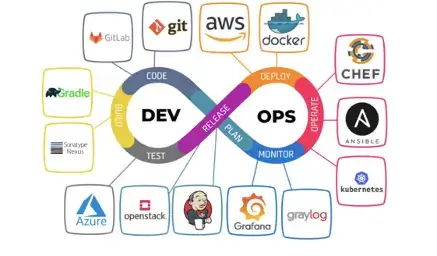Follow the trend

In the fast-paced world of software development, DevOps has emerged as a game-changing approach that combines development and operations to optimize collaboration, automate workflows, and enhance the efficiency of software delivery. In this blog, we will delve into the realm of DevOps tools, exploring a diverse range of technologies that empower organizations to streamline their development processes, automate infrastructure management, and achieve continuous integration and deployment. Join us as we uncover the key DevOps tools that are revolutionizing the industry.
Discover the power of Jenkins, an open-source automation server that enables continuous integration and delivery pipelines, facilitating the seamless integration of code changes and automating the build and deployment processes.
Unleash the potential of Git, a widely adopted distributed version control system. Explore its features such as branching, merging, and pull requests, enabling efficient code collaboration and version control across development teams.
Learn about Ansible, an agentless configuration management tool that automates the provisioning and configuration of infrastructure resources. Explore its declarative language and role-based architecture, simplifying the management of complex infrastructure environments.
Dive into Puppet, an infrastructure automation tool that enables configuration management and ensures consistent state enforcement across distributed systems. Discover its powerful resource abstraction and domain-specific language, facilitating scalable infrastructure management.
Explore Docker, a leading containerization platform that allows applications to be packaged into lightweight, portable containers. Learn how Docker streamlines the deployment and management of applications, enabling consistency and scalability across different environments.
Explore the revolutionary potential of Kubernetes, a container orchestration platform that is open-source. Gain insights into how Kubernetes automates the process of deploying, scaling, and managing containerized applications. By doing so, it optimizes resource allocation and guarantees exceptional availability for your applications.
Delve into Travis CI, a cloud-based continuous integration and deployment platform. Explore its seamless integration with popular version control systems, enabling automated testing, building, and deployment of software applications.
Discover CircleCI, a flexible and scalable continuous integration and delivery platform. Learn how it enables teams to automate their software delivery pipelines, accelerate feedback loops, and ensure reliable deployment processes.
Explore Prometheus, an open-source monitoring and alerting toolkit. Discover how it collects metrics, stores time-series data, and enables real-time monitoring and alerting for applications and infrastructure.
Uncover the power of the ELK (Elasticsearch, Logstash, Kibana) Stack, a comprehensive log management and analysis solution. Learn how it enables centralized log collection, parsing, and visualization, empowering teams to gain insights into application performance and troubleshoot issues.
DevOps tools play a vital role in enabling organizations to achieve seamless collaboration, automate processes, and achieve faster, more reliable software delivery. By leveraging the right combination of tools, teams can streamline their development workflows, automate infrastructure management, and foster a culture of continuous improvement. As the DevOps landscape continues to evolve, embracing these essential tools becomes crucial for staying competitive and delivering high-quality software products in today's dynamic business environment.
Your email address and mobile will not be published.




